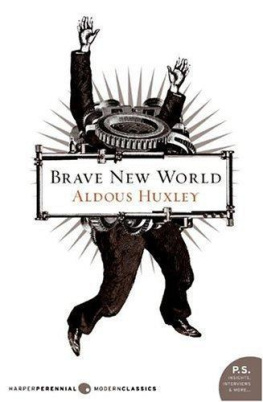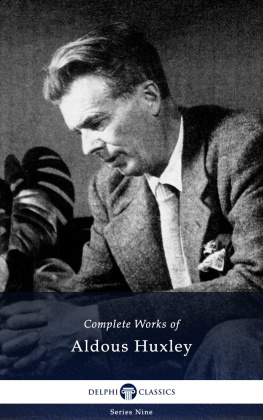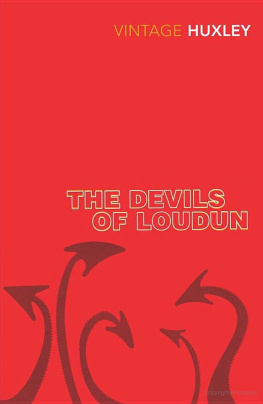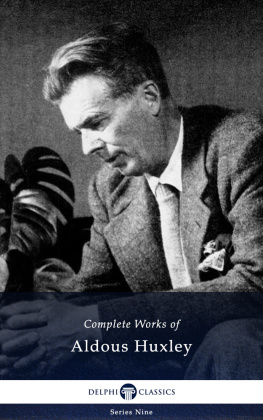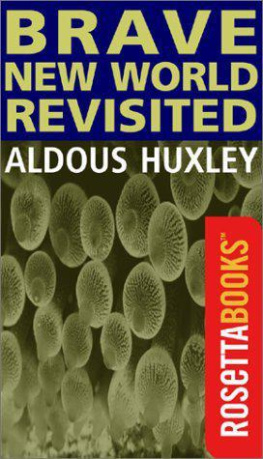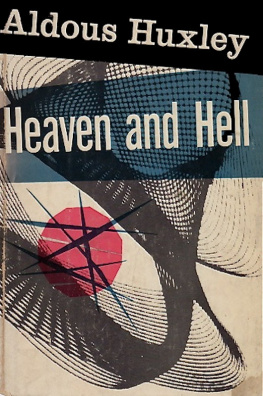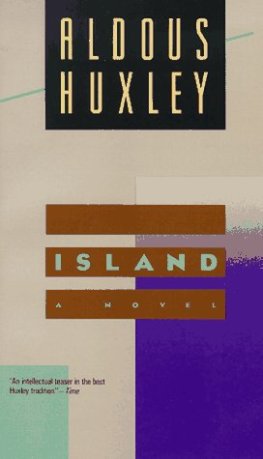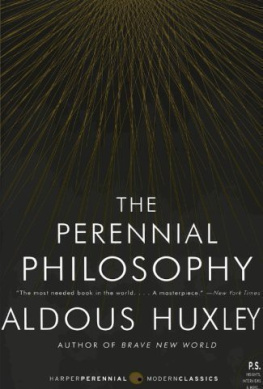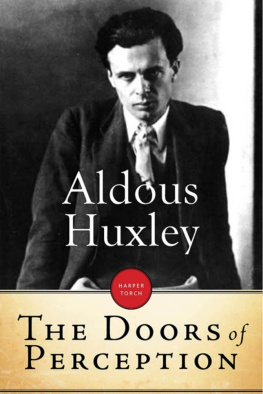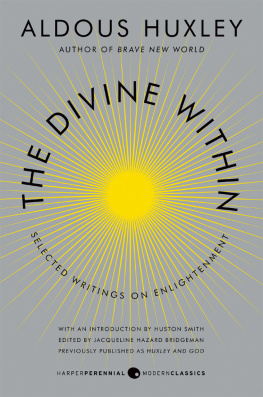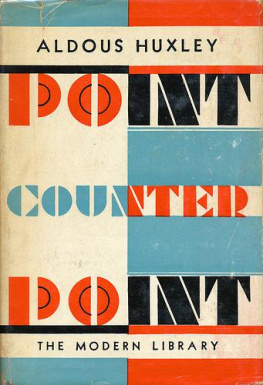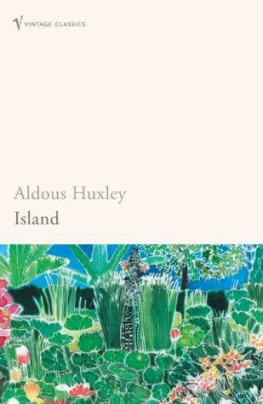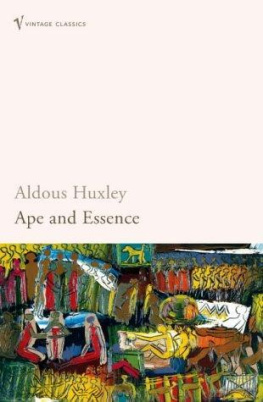Aldous Huxley - The Perennial Philospy
Here you can read online Aldous Huxley - The Perennial Philospy full text of the book (entire story) in english for free. Download pdf and epub, get meaning, cover and reviews about this ebook. City: London, year: 1947, publisher: Chatto & Windus, genre: Religion. Description of the work, (preface) as well as reviews are available. Best literature library LitArk.com created for fans of good reading and offers a wide selection of genres:
Romance novel
Science fiction
Adventure
Detective
Science
History
Home and family
Prose
Art
Politics
Computer
Non-fiction
Religion
Business
Children
Humor
Choose a favorite category and find really read worthwhile books. Enjoy immersion in the world of imagination, feel the emotions of the characters or learn something new for yourself, make an fascinating discovery.

- Book:The Perennial Philospy
- Author:
- Publisher:Chatto & Windus
- Genre:
- Year:1947
- City:London
- Rating:3 / 5
- Favourites:Add to favourites
- Your mark:
- 60
- 1
- 2
- 3
- 4
- 5
The Perennial Philospy: summary, description and annotation
We offer to read an annotation, description, summary or preface (depends on what the author of the book "The Perennial Philospy" wrote himself). If you haven't found the necessary information about the book — write in the comments, we will try to find it.
The Perennial Philospy — read online for free the complete book (whole text) full work
Below is the text of the book, divided by pages. System saving the place of the last page read, allows you to conveniently read the book "The Perennial Philospy" online for free, without having to search again every time where you left off. Put a bookmark, and you can go to the page where you finished reading at any time.
Font size:
Interval:
Bookmark:



PUBLISHED BY
Chatto & Windus
LONDON
*
Oxford University Press TORONTO
Applications regarding translation rights in any
work by Aldous Huxley should be addressed
to Chatto & Windus, 40 William IV Street,
London, W.C. 2
FIRST PUBLISHED 1946
SECOND IMPRESSION 1947
PRINTED IN GREAT BRITAIN
IN COMPLETE CONFORMITY WITH
THE AUTHORIZED ECONOMY STANDARDS
ALL RIGHTS RESERVED
Contents
Introduction page i
Chapter i That Art Thou 7
ii The Nature of the Ground 29
in Personality, Sanctity, Divine Incarnation 45
iv God in the World 69
v Charity 95
vi Mortification, Non-Attachment, Right
Livelihood 113
vii Truth 145
vin Religion and Temperament 168
ix Self-Knowledge 185
x Grace and Free Will 190
xi Good and Evil 202
xn Time and Eternity 212
xin Salvation, Deliverance, Enlightenment 230
xiv Immortality and Survival 242
xv Silence 247
xvi Prayer 251
xvn Suffering 260
xvm Faith 268
Chapter xx Tantum religio potuit suadere malorum page 279
xxi Idolatry 287
xxn Emotionalism 292
xxni The Miraculous 298
xxiv Ritual, Symbol, Sacrament 301
xxv Spiritual Exercises 314
xxvi Perseverance and Regularity 334
xxvn Contemplation, Action and Social Utility 337
Bibliography 346
Index 353
Acknowledgments
For permission to use the following selections, grateful acknowledgment and thanks are extended to the following authors and publishers:
George Allen & Unwin Ltd.: MONKEY and THE WAY AND ITS POWER, translated by Arthur Waley; LETTERS, by Spinoza.
Burns, Oates & Washbourne Ltd.: THE CLOUD OF UNKNOWING, edited by McCann; THE WORKS OF ST. JOHN OF THE CROSS, translated by Allison Piers.
Cambridge University Press: STUDIES IN ISLAMIC MYSTICISM, by R. A. Nicholson.
/. M. Dent & Sons Ltd.: ADORNMENT OF THE SPIRITUAL
MARRIAGE, by Ruysbroeck, translated by Winschenk Dom.
P. J. and A. E. Dobell: CENTURIES OF MEDITATION, by Thomas Traherne.
Dwight Goddard Estate: A BUDDHIST BIBLE, by Dwight Goddard.
Kegan Paul, Trench, Trubner & Co. Ltd.: MASNAVI, by Jalal-uddin Rumi, translated by Whinfield.
Longmans, Green & Co. Ltd.: THE SPIRIT OF ST. FRANCIS DE SALES, by Jean Pierre Camus, translated by Lear; CATHERINE OF SIENA, by Johannes Jorgensen.
Macmillan & Co. Ltd.: THEOLOGIA GERMANICA, translated by Winkworth; THE SPIRITUAL REFORMERS, by Rufus Jones; MYSTICISM EAST AND WEST, by Rudolph Otto; ONE HUNDRED POEMS OF KABiR, by Rabindranath Tagore.
John Murray and Mr. Lionel Giles : MUSINGS OF A CHINESE MYSTIC, from THE WISDOM OF THE EAST series, translated by Herbert Giles.
Oxford University Press and Harvard University Press: THE TRANSFORMATION OF NATURE IN ART, by Amanda K. Coomaraswamy.
Oxford University Press and The Pali Text Society: THE PATH OF PURITY, by Buddhaghosha.
Oxford University Press: THE TIBETAN BOOK OF THE DEAD, translated by Dr. Evans-Wentz.
Paramananda and the publishers of BHAGAVAD-GITA.
George Routledge & Sons Ltd.: STUDIES IN THE LANKAVATARA SUTRA, by Suzuki.
Skeed & Ward Ltd.: THE MYSTICAL THEOLOGY OF ST. BERNARD, by Etienne Gilson.
The Society far Promoting Christian Knowledge: DIONYSIUS THE AREOPAGITE, translated b^ C. E. Rolt.
John M. Watkins: WORKS OF MEISTER ECKHART, translated by Evans; THE CREST-JEWEL OF WISDOM, by Shankara, translated by Charles Johnston.
INTRODUCTION
PHILOSOPHIA PERENNISthe phrase was coined JL by Leibniz; but the thingthe metaphysic that recognizes a divine Reality substantial to the world of things and lives and minds; the psychology that finds in the soul something similar to, or even identical with, divine Reality; the ethic that places man's final end in the knowledge of the immanent and transcendent Ground of all beingthe thing is immemorial and universal. Rudiments of the Perennial Philosophy may be found among the traditionary lore of primitive peoples in every region of the world, and in its fully developed forms it has a place in every one of the higher religions. A version of this Highest Common Factor in all preceding and subsequent theologies was first committed to writing more than twenty-five centuries ago, and since that time the inexhaustible theme has been treated again and again, from the standpoint of every religious tradition and in all the principal languages of Asia and Europe. In the pages that follow I have brought together a number of selections from these writings, chosen mainly for their significancebecause they effectively illustrated some particular point in the general system of the Perennial Philosophybut also for their intrinsic beauty and memorableness. These selections are arranged under various heads and embedded, so to speak, in a commentary of my own, designed to illustrate and connect, to develop and, where necessary, to elucidate.
Knowledge is a function of being. When there is a change in the being of the knower, there is a corresponding change in the nature and amount of knowing. For example, the being of a child is transformed by growth and education into that of a man; among the results of this transformation is a revolutionary change in the way of knowing and the amount and character of the things known. As the individual grows up, his knowledge becomes more conceptual and systematic in form, and its
factual, utilitarian content is enormously increased. But these gains are offset by a certain deterioration in the quality of immediate apprehension, a blunting and a loss of intuitive power. Or consider the change in his being which the scientist is able to induce mechanically by means of his instruments. Equipped with a spectroscope and a sixty-inch reflector an astronomer becomes, so far as eyesight is concerned, a superhuman creature; and, as we should naturally expect, the knowledge possessed by this superhuman creature is very different, both in quantity and quality, from that which can be acquired by a star-gazer with unmodified, merely human eyes.
Nor are changes in the knower's physiological or intellectual being the only ones to affect his knowledge. What we know depends also on what, as moral beings, we choose to make ourselves. * Practice,' in the words of William James,' may change our theoretical horizon, and this in a twofold way: it may lead into new worlds and secure new powers. Knowledge we could never attain, remaining what we are, may be attainable in consequence of higher powers and a higher life, which we may morally achieve.' To put the matter more succinctly, * Blessed are the pure in heart, for they shall see God.' And the same idea has been expressed by the Sufi poet, Jalal-uddin Rumi, in terms of a scientific metaphor: ' The astrolabe of the mysteries of God is love.'
This book, I repeat, is an anthology of the Perennial Philosophy; but, though an anthology, it contains but few extracts from the writings of professional men of letters and, though illustrating a philosophy, hardly anything from the professional philosophers. The reason for this is very simple. The Perennial Philosophy is primarily concerned with the one, divine Reality substantial to the manifold world of things and lives and minds. But the nature of this one Reality is such that it cannot be directly and immediately apprehended except by those who have chosen to fulfil certain conditions, making themselves loving, pure in heart, and poor in spirit. Why should this be so ? We do not know. It is just one of those facts which we have to accept, whether we like them or not and
Font size:
Interval:
Bookmark:
Similar books «The Perennial Philospy»
Look at similar books to The Perennial Philospy. We have selected literature similar in name and meaning in the hope of providing readers with more options to find new, interesting, not yet read works.
Discussion, reviews of the book The Perennial Philospy and just readers' own opinions. Leave your comments, write what you think about the work, its meaning or the main characters. Specify what exactly you liked and what you didn't like, and why you think so.

